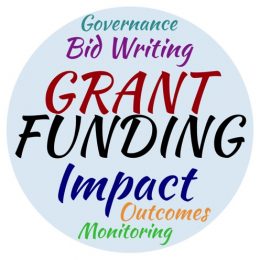 Having started to build some solid foundations for giving you the best chance of success with grant fundraising, Julia is now going to look at some aspects in a bit more detail. In this and the next posting we focus on Finding and Approaching potential funders.
Having started to build some solid foundations for giving you the best chance of success with grant fundraising, Julia is now going to look at some aspects in a bit more detail. In this and the next posting we focus on Finding and Approaching potential funders.
How to find potential funders
- Keep true to your vision
 Know the difference you want to make and look for funding that helps you achieve it. It was passion for seeing a change or something improved that got you started, and it will be that same passion that will get you funded.
Know the difference you want to make and look for funding that helps you achieve it. It was passion for seeing a change or something improved that got you started, and it will be that same passion that will get you funded.
Don’t let yourself be diverted by looking at whatever funding is currently available and trying to shoe-horn your project to fit a different shape.
- When is the best time to apply?
- When to apply? When you have everything ready to submit a good application! However do make sure you apply at least 3-4 months before you need the funding.
Most funders have a cycle throughout the year of times when they are open for applications so make sure you meet their deadlines. Others receive applications at any time.
- Where do I start?
- Always start with your local Community Foundation – each county in England has one. Community Foundations are normally very supportive, helpful, small(ish) local funders who hold different pots of funding for your geographical area. They will be pleased to hear from you, interested in the work you are doing and able to advise you on suitable grant-funding to apply for. Make sure you get on their mailing list so you are kept up to date with funding opportunities.
- Research established Local Funders
- Local Funders have normally been in existence for a significant amount of time and are focused on a particular geographical area which can be large or small. Your Community Foundation should be able to give you guidance on who would be appropriate to apply to.
- Sign up to Funding Central
- Create a profile detailing the types of activity or issues you are looking to impact, along with the type and amount of funding you are looking for, and it will give you a list of potential funders to consider. It will also keep you regularly updated on funding deadlines etc. It’s a great resource and free if you are a small charity.
 Find out where others have got their funding from
Find out where others have got their funding from
- Identify charities like yours and read through their accounts on the Charity Commission website to find out you where they got their funding from. You can then look up the funders and see if you might be eligible.
- Create a database or spreadsheet of information
- Record details of the funder priorities, eligibility criteria, submission deadlines, average funding amounts and their grant-making process. This will help you to prioritise which funders are the best fit and when you need to be applying to them.
Next time we are going to focus on how best to approach our newly found funders.
For further information contact Julia Miller
